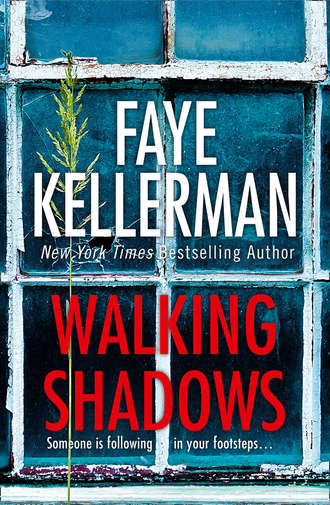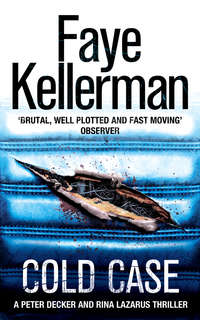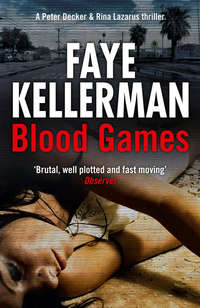
Полная версия
Walking Shadows
“Or lying,” McAdams said.
“Always a strong possibility,” Decker said. “Get the tapes and we can all watch some TV tomorrow. Right now, let’s go home.”
They all walked out to the parking lot together. McAdams said, “You’re taking me home?”
“Unless you want to walk.”
McAdams said, “What are you going to do after Riley Summers?”
“Well, assuming I let him go, I suppose I’ll go track down Brady’s friend Boxer.”
Butterfield smiled. “Boxer?”
“Apparently he works in Bigstore’s warehouse department.”
“Maybe Brady Neil’s friend is a dog. Or maybe Boxer is the name of his profession? Or his favorite hobby?” McAdams started jumping around feigning punches. One came near Decker’s face, close enough that Decker jerked his head back.
“What is wrong with you?” He was annoyed. “Did you take your Ritalin this morning?”
McAdams looked chastened. “Sorry.”
Butterfield said, “Where’d you learn the moves?”
“I’ve been taking mixed martial arts classes in Boston.”
“Really?”
“No joke. I started with Brazilian jiujitsu. On the first day of class, I grappled with a five-foot, ninety-nine-pound girl and she took me down. After that, I switched to boxing.”
Decker smiled. “There’s got to be a lesson here somewhere.”
“Of course, there is. Don’t get hurt. However, if you do get hurt, you can always sue.”
AT ELEVEN THE next morning—after an hour of interviewing Riley Summers—Decker was having a hard time deciding if the kid was a deft psycho or if he was just another confused and/or stoned teen. The few coherent statements he did make seemed to jibe with the statements given by Dash Harden and Chris Gingold. Perhaps they all colluded, but it was hard to believe that these guys could keep a false story straight without tripping up. In the end, Decker released the kid, giving him the same stern warning that he gave Harden and Gingold yesterday: keep your nose clean and don’t go anywhere too far away.
“Does that mean I don’t have to go to work?” Riley was wearing jeans and a T-shirt and was scratching a pimple on his face.
Lennie looked at Decker for guidance. He said, “You can go to work, Riley. Just don’t go anywhere far. Where do you work?”
“Eddie’s Gas.”
Decker said, “On Milliken, off the highway?”
“Yeah.”
“What do you do?”
“Pump gas. Eddie don’t use automated machines.”
“Why not?” Lennie asked.
“’Cause that way he can charge for full service. That’s why I pump gas. I also wash windows and check oil.”
Maybe Harden was the smart one. “It’s okay for you to work, Riley.”
“Fine. Can I go now?”
“Yes.” To Lennie, Decker said, “Could you see him to the door, Officer Baccus?”
“Of course.”
After they left, Decker picked up his car keys. He met Lennie as she was coming back into the station. “I’m going to Brady Neil’s place of work, specifically to interview a guy nicknamed Boxer who works in the warehouse of Bigstore in Hamilton.”
“There are two Bigstores in Hamilton. Which one?” Decker showed her the address. “That’s near me in Claremont.”
“Where’s the other Bigstore?”
“Right outside Bitsby.”
“The Bitsby one is nearer to Brady Neil. I wonder why he didn’t work there?”
“The Bigstore in Claremont is bigger and has higher-end things.”
“Ah. Do you shop there?”
“I’ll buy food and household stuff. Sometimes I’ll get coffee and a muffin in the café. It’s cheap.”
“Are you there often?”
Lennie thought. “Once a week.”
“And you know some of the employees?”
“A few by name. Most by sight. Do you want me to come with you, boss?”
“Yes. While I interview this guy, Boxer, you ask around. I’m sure by now everyone has heard of Brady Neil’s murder. It made front-page news. There are bound to be some rumors floating around the place, some sotto voce. It’s your area store. It’s in your city. People will feel more natural around you. See what you can pick up.”
“Of course. What do I tell them if they ask me questions?”
“You tell them nothing, but you make it sound like you’re telling them something. You’re going back to Hamilton after this investigation is over. You’ve got to get along with the people you serve. So just dodge their questions. But be really nice about it.”
“HE’S NOT HERE.”
“Okay.” Decker looked around the warehouse. It was enormous, with enough supplies to outfit a third-world nation, and he hadn’t even made it to the food storage section. He was talking to a guy in his late twenties—beefy build with muscled arms. He had pierces in his thick lips and a shaved head that was tattooed except for a natural colored red/orange mohawk running down the middle. He was Phil G. Decker knew this because his green Bigstore name tag told him so. The kid was halfway up a ladder stocking some game systems, when Decker asked, “Do you know when he’s coming back?”
“No idea.” Phil pushed the three boxes he was carrying on an open shelf and climbed down. His forehead was beaded with sweat. No A/C in the place, just a bay with barn doors that were open. He faced Decker. “Boxer didn’t show up yesterday and he didn’t show up today. Tomorrow’s his day off … if he still has a job.”
“Has anyone tried to call him?”
“Wouldn’t know. I didn’t call him. He wasn’t a pal. Ask the manager.”
“And where would I find the manager?”
“In her office.”
“And where is her office?”
“All the way in back. When you get to the barn doors, hook a left, then go past the food warehouse, then hook a right and the offices are there. Her name is Barbara Heiger.”
“Okay. Thanks, Phil. Do you know Boxer’s real name? It’s obviously not Boxer.”
“Nah, it’s not Boxer, but that’s what everyone called him.”
“Did he box?”
“You’ve never seen him, huh?”
“No, I’ve never seen him.”
“Scrawny guy. Around five eight with stringy arms.”
“You didn’t like him.”
“Didn’t like him, didn’t hate him. We didn’t hang. He was Brady’s friend. They hit it off right away.” Phil looked down. “Poor Brady. I talked to him now and then when he came into the warehouse. Once in a while, he’d bring in pretzels and chips for us ghouls to snack on. He said they were leftovers from a party, but the bags were always unopened. What the hell happened to him?”
“That’s what we’re looking into. You thought Brady was a good guy?”
“Yeah, from the little contact I had with him. He worked resale. He’d come in to talk to Boxer but would always acknowledge me … the other guys. It goes a long way, you know.”
“What do you mean goes a long way?”
“To most people, we’re furniture. Brady made you feel human. But like I said, he mostly talked to Boxer.”
“And because Boxer was Brady’s friend, we just wanted to ask him a few questions. Any idea where he lives?”
The lightbulb went off in Phil’s head. “You think something happened to Boxer?”
“The thought crossed my mind.”
“Oh Jesus! That would be …” Phil’s jaw was working hard. “Is there something going on with this store? I mean, two guys working here. That’s a little coincidental, right?”
“If you’re just doing your job, I don’t think you have anything to worry about.”
“Whadaya mean by that?”
“I mean if you keep out of trouble, you should be okay.”
“Was Brady in trouble?”
“I’m trying to figure that out. And once I do know what’s going on, I’ll tell you. Here’s my card.” Decker handed it to him. “If you think of anything strange or unusual or just something that you think the police should know, call me. I want to find Boxer, if for no other reason just to know that he’s safe.”
“Yeah, I get it. Boxer did his job but isn’t as big as some of us. He’s vulnerable.”
“Nobody is immune to vulnerability, Phil.”
“But some are more vulnerable than others.” Phil scratched his head on his tiger tattoo. “I mean no harm when I say this, but Boxer … there’s something about him. Some people are just born with a Kick Me sign plastered on their asses.”
BARBARA HEIGER WAS out to lunch. Decker wandered over to the next open office. It belonged to C. Bonfellow, Bookkeeper. He appeared to be in his midforties, short and overweight with thinning sandy hair and dark suspicious eyes. He sat behind a scarred desk that was piled with paper in slotted trays. “Can I help you?”
“I hope so.” Decker showed C. Bonfellow his badge.
“Police? What’s this about?”
“Do you make out the salary checks?”
“Me, personally? No. It’s all done by computer. And if you’re looking for someone in particular, I’m not the guy. You need to talk to Susan or Harold in HR. I just balance the numbers.”
“Where is HR?”
“Three doors down. Who are you looking for, by the way?”
“A guy named Boxer?”
“Don’t know him.”
“You’re not the only one. Thanks.”
Decker was about to go, when Bonfellow said, “If you leave your card, I’ll call if I hear of anything.”
“Sure.” Decker handed the bookkeeper his card. “What kind of things do you usually hear about, Mr. Bonfellow?”
The man turned pink. “Not that I gossip. I don’t. And most of the time, I’m behind a desk. But people don’t notice me a lot. They kind of talk like I’m not there and I pick up things … keep things filed in storage.” He pointed to his head. “I’ll keep my ears open for this Boxer person. I’ll call you if I hear anything juicy.”
“Thanks. Don’t put yourself out. If someone found out you’ve overheard a private conversation, it might make them mad.”
“Oh, I know that, Detective.” Bonfellow smiled. “I’m a very careful man.”
IN HR, THERE were two people to approach. Decker homed in on Susan Jenkins, who was kind enough to look up the name in the company computer. She was in her midthirties, short but with a very long neck. She reminded Decker of a swan. She wore a black T-shirt and jeans. “There is no Boxer assigned to the warehouse, but … there is a Joseph Boch.”
“That’s probably the guy I’m looking for. Do you have his address and phone number?”
“I do, but I can’t give it to you. Company policy.” She smiled. “I’m going to the watercooler. I’ll be right back.”
“Take your time,” Decker said. Once she left, he looked on the screen. Joseph Boch was thirty-five, and by the date of his employment records, he’d been working there nine months. Decker quickly copied the address and phone number in his notebook.
She returned a moment later with a conical paper cup and sipped water. “Is there anything else?”
“Thank you very much, Ms. Jenkins. You’ve been a big help.” He paused. “How long does your average employee work here?”
She looked up at him. “I really couldn’t tell you. What I can tell you is that we have a lot of turnover, specifically because we have a lot of temp teens working in the summer.”
“And you have no idea about the working life span of your permanent employees?”
“If I had to guess, I’d say not more than a few years. It’s barely more than minimum wage unless you’re in management. And most management isn’t from the bottom up.”
“Where do they go—the ones who quit after a year?”
Susan was thoughtful. “I couldn’t tell you personally, but it’s the same old story in Hamilton. I think a lot of them have alcohol or serious drug issues. Or both. When they’re sober, they can hold down a job. But it’s a really boring job, so they start getting high again. And when they’re high, they can’t hold down jobs. It’s a vicious cycle. Sad, but not unpredictable. What else does Hamilton have to offer?”
“You’re here.”
“I grew up here, but I never intended to stay. I went to Clarion College on a scholarship; met my husband, who was at Kneed Loft; and we moved to Phoenix. He came down with an illness that does much better in cold climate. So here we are.”
She brought out a brown bag and unwrapped a sandwich.
“I have my mother and sister here. It’s not so bad now that I’m married with kids. But when I was growing up … geez, all I wanted to do was get out of here.” Biting into her sandwich, she said, “Probably told you way more than you wanted to know.”
“Not at all, Ms. Jenkins, it’s always good to get background.”
“I can tell you’re not from these parts.”
“I work with Greenbury PD. Before that, I was with Los Angeles Police for thirty-five years.”
“Wow, that’s a change of scenery. What drew you to Greenbury?”
“Change of scenery as well as a change of pace. Compared to L.A., even Hamilton seems idyllic.”
“I’m probably making Hamilton more horrible than it is. We have our doctors, lawyers, hospitals, libraries, schools, police, churches, yadda, yadda, yadda. It’s a decent place, but it’s not exceptional. We’re what politicians call God and gun people.”
“Nothing wrong with that.”
“I don’t know about that, Detective. With God, it’s a round-trip ticket. The Lord destroys, but the Lord also creates. With guns, it’s strictly a one-way fare.”
CHAPTER 9
LENNIE BACCUS WAS eating a muffin and chatting up one of the women who worked behind the counter. When she saw Decker, she stood up, wiped her mouth, and said her good-byes. She took her coffee in her right hand, another to-go coffee in her left, and met up with the boss. “I thought you could use one of these.”
“Thank you.”
“Black, right?”
“You’re a quick study. Let’s go.”
“Where are we going?”
“I think I got Boxer’s address. We’ll talk in the car.”
Silently they walked across a big expanse of asphalt. The parking lot was half full, mostly small cars and pickups. Once in the car, Decker put the keys in the ignition. As soon as he pulled onto the street, he said, “You go first.”
“Not too much.” Lennie pulled out her notepad. “I talked to four people—the two women who work at the café—Marie and Gilliam. Neither of them know Boxer, but they did know Brady Neil. He used to come and buy coffee and a croissant, and he was always friendly. They felt really bad and a little worried, like it has something to do with the store.”
“It might,” Decker said. “Joseph Boch a.k.a. Boxer hasn’t shown up for work in two days.”
“Since Neil’s death. Wow. That’s a little creepy.”
“The guy I talked to in the warehouse—his name is Phil—described Boxer as a little guy and kind of a wimp. If he and Neil were stealing electronics, I can bet who ran the show.”
“If the company found out,” Lennie said, “they’d just fire them. Not kill anyone.”
“No, you’re right about that. But we have to start somewhere, and since Boxer didn’t show up at work, we need to find out why. You said you talked to four people. Who are the other two?”
“Buss Vitali, who worked alongside Brady Neil. Said he had no problems with Brady, that he was a nice guy. Always willing to carry an extra load to help someone out.”
“Could be he was a nice guy. Or it could be because he was a nice guy, his coworkers looked the other way.”
“You really think he was stealing.”
“I think he was pulling off some kind of scam. Especially now that Boxer is AWOL. Who’s the last person you talked to?”
“Well, Buss pointed me toward a girl named Olivia Anderson, who works in clothing. She and Brady went out a couple of times. She didn’t show up yesterday for work, but she was there today. It looked to me like she’d been crying.”
“What’d she say to you?”
Lennie checked her notepad. “They were dating for around two months, but then he broke it off. Neil told her that he had something he needed to work on. But he never told her what.”
“When did he break off the relationship?”
“About six months ago.”
“When you get back to the station house, call her and say that I’d love to talk to her. She can either come to the station or I’ll interview her at her home.”
“She seemed like a nice girl.”
“And by all accounts, Brady was a nice guy. But something got him killed.”
“Can I come with you when you interview her?” Lennie bit her lip. “I think she trusts me. It might make things easier.”
“I’m sure you would help, Baccus, but this isn’t a look-see. I need someone experienced to play off of. It’s going to be McAdams. Did you give her your phone number?”
“I gave her my card, yes.”
“Good. Then she might call you after she’s talked to us. If she wants to talk to you, that would be fine. But do it in an open place. Do not go to her house, okay?”
“Got it.”
“Did she say anything else other than Brady was a nice guy?”
“Just that he paid for everything. Consistent with the mother saying he always had cash.”
“Do you see him earning that much cash from recycled parts?”
“Enough for a dinner at Steaks! and a movie. Not enough to take her on a trip to Paris.”
“Yeah, having an extra fifty bucks qualifies as having lots of cash around here. And it’s certainly possible to make an extra fifty bucks in recycled parts. Especially if you didn’t pay for any of it.”
“True, but would an extra fifty bucks get you killed?” Lennie asked.
Decker said, “I’ve seen people killed for less. Especially if you’re an addict. But addicts don’t usually take a body from the crime scene and dump it in a second spot. They just take the cash and run.”
“And it’s a definite that Brady Neil wasn’t killed on Canterbury Lane?”
“The blood loss at the scene doesn’t fit the severity of the wound. Plus, we have a second person of interest who’s missing. This seems like something more than some random mugging.”
“Maybe Joseph Boch a.k.a. Boxer can shed some light on the situation.”
“One can always hope.” Decker smiled. “And one can always be disappointed.”
THE ADDRESS WAS in an impoverished area on Crane Street. It was a small bungalow with a wraparound porch, the house built around the turn of the twentieth century. The outside lawn was brown even though the weather was no longer cold, but there were a few weeds popping up, giving it spots of green. No planting along the border or the steps, but there was a giant oak tree that shaded a crumbling stone pathway to the front door. Although the place had a dirt driveway, there was no car parked outside. The whitewashed flooring of the porch was missing boards, and what was still there was splintered and looked none too safe to walk on.
When they reached the front door, Decker pulled back a torn screen and knocked on the sash. After announcing himself several times, he closed the screen. He went around to the side yard and peeked over. “Don’t see a car.”
He eased his shoe into a chain link and hopped over the fence.
Lennie said, “Do you want me to follow you?”
“Nah, just going to have a look around. See if there’s any visibility from a back window inside the house.”
The backyard was as brown as the front but with no tree to give it any life. The area was fenced off from its neighbors by chain link alternating with rotted two-by-fours. Spare automobile parts were strewn about—a few rusted hubcaps, a piece of a fender, several spare tires, and three or four wheel-less bicycles. The house had two windows that looked out to the backyard, but the curtains had been pulled. He knocked on the back door.
No answer.
“Detective Decker?” Lennie yelled out.
“Over in the back. I’ll be with you in a moment.”
“You okay?”
“I’m fine.” Decker took a last look around, and then he scaled the fence and landed on his feet with a thud. Thank God for rubber-soled shoes. “Quiet as a tomb.”
“Just leave our cards?”
“No, I’m going to try his phone. You call up records and find out who the house belongs to.” Decker punched in the numbers, and the line went straight to voice mail. While he was considering his next move, Lennie interrupted his musings.
“The tax bill goes out to Jaylene Boch. She’s fifty-nine and bought the house twenty-five years ago.”
“Call up the station and ask whoever is there to look her up.”
“Greenbury or Hamilton?”
“Greenbury.” Decker looked through the front windows, which were obscured by curtains just like the back of the house. “If they don’t have anything on her, we’ll try Hamilton. And while you’re talking to someone at Greenbury, find out what they pulled up on Joseph Boch.”
“Right away.”
Decker tried the front-door handle. It was locked, but by jiggling it, he could tell that the spring pin wasn’t very tight. He picked up his phone and called McAdams, who was still pulling CCTV from Tollway Boulevard. After a brief recap of his morning activities, Decker said, “I have Lennie on several calls. Can you get a cell-phone number for Jaylene Boch?”
“If I were at the station house, I could. But not here in the field.”
“Right. Who’s there now?”
“Nickweed might be there. Kev is here with me. I bet Radar’s there.”
“I’ll give him a call.”
“Can’t you jiggle the lock?”
“I could, but that wouldn’t be legal.”
“The guy’s been missing for two days. Can’t you justify a forced entry?”
“He’s an adult. And you’re the law student. What do you think?”
“Your hands are tied, unless you smell something weird.”
“The windows are shut, so if something’s rotting away, it hasn’t leaked out in the open. Lennie just got off the phone. Let me see what she’s come up with. Talk to you later.” He walked over to Baccus. “What’s up?”
“I spoke to the captain. He says he’ll call you back with the background information and the phone numbers. What do we do now?”
“We wait around until Radar gives me a call. Want a cup of coffee or something? I think I saw a place a couple blocks away.”
“No, thanks, I’m pretty coffee’d out.”
Decker said, “I’m going to call my wife.”
“Do you want privacy?”
“I’ll take a walk down the block.” He walked away for a short distance, then phoned Rina. “Hey.”
“Hi, I’m in the car. Can I call you back in ten minutes?”
“It might not work. I have a lull right now, but I don’t want you talking while you’re driving.”
“Everything okay?”
“Just a whole lot of nothing … well, that’s not entirely true.” He told her about Boxer and his disappearing act.
Rina said, “That doesn’t sound good.”
“No, it doesn’t. Not with Brady Neil being dead. I’m trying to get information on Jaylene Boch from Radar, who’s busy right now. We seem to be a little shorthanded.”
“Have you tried looking her up on the internet on your phone?”
“And what’s that going to tell me?”
“Maybe nothing, but you never know. Hold on. I’ll pull over.”
“Nah, don’t bother.”
“Just hold on. There’s a space right here.” A moment passed. “Okay. What’s the name?”
“Jaylene Boch.” Decker spelled it.
“Unusual name. Let’s see if she has any hits.”
“How are you doing?” Decker asked.
“I’m fine. I just spoke to my mom.”
“How is she?”
“Okay. It’s been a while since we’ve visited either mother. Since they both live in Florida, it should be part of our summer plans.”
“Yeah, you’re right. We’ll go, but not in the summer, please. It’s so hot and humid.”
“Fair enough, but no more excuses.” Rina shook her head. “Okay, here we go with Jaylene Boch. There are six citations, all of them having to do with a car accident eight years ago.”
“Car accident?”
“Yes. I’ll pull up the article …” A pause. “This is sad. She was plowed into by an eighteen-wheeler semi. She got a pretty good settlement. But the poor thing is in a wheelchair.”
“Well, that certainly changes things. If Boxer was her son and he disappeared, I’m wondering who is taking care of Jaylene. And that might justify a welfare check. I’ll call Radar and see what he thinks. Thank you, honey. As usual, you’ve been a big help.”









